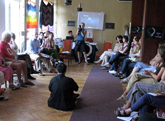 7 September 2012, Vrnjačka Banja
7 September 2012, Vrnjačka Banja
Around 50 participants from a variety of organisations - including a number of representatives from Srebrenica victims’ associations – today attended a debate and screening of the Outreach programme’s documentary on sexual violence organised by the NGO Women in Black. The event took place in the Hotel Slatina in Vrnjačka Banja, Serbia.
Prior to the screening, Outreach representative Morgiana Brading talked to the assembled audience about the ongoing efforts to intensify outreach activities in the final years of the Tribunal’s mandate. She explained that one of the key tasks in this effort was familiarising the people of the region of the former Yugoslavia with the major achievements of the Tribunal, stressing that the work to classify sexual violence as a war crime was among the most important.
Following the screening, one of the Srebrenica victims’ representatives was the first to speak:
“Only victims know what it is like to live after such horrible things happen to them. How does a six-year-old continue after something like this? However, having the chance to talk about it before the Tribunal was hugely important. Without that, we would have nothing today, we would be nowhere.”
An emotional discussion ensued, during which many of the women stressed how important education and family were in helping to prevent such crimes in the future. The discussion also focused on the re-integration of victims of sexual violence into society. While the Tribunal provides material and psychological support to those who testify before it during their time in The Hague, there is little long term help for victims, many of whom face huge difficulties in re-building their lives in their own villages, town and cities. In addition, many victims are still waiting for justice while at the same time fighting against the stigma that society often attaches to them.
In conclusion, one woman said: “This is an important movie. Nobody in the region talks about this apart from victims. It should be shown all over the region and other educational movies should also be made.”

